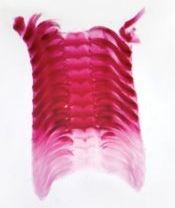Final flashcards
1/154
There's no tags or description
Looks like no tags are added yet.
Name | Mastery | Learn | Test | Matching | Spaced |
|---|
No study sessions yet.
155 Terms
Penicillin
What is the fungus responsible for a very important medical discovery?
Ascomycota
What is the largest phylum of fungi?
Basidiomycota
What phylum are mushrooms and puffballs in?
Zygomycota
What phylum are bread molds in?
Foliose
What type of lichen is this?
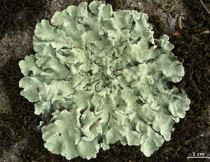
Fruticose
What type of lichen is this?
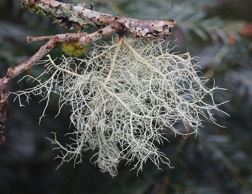
Crustose
What type of lichen is this?
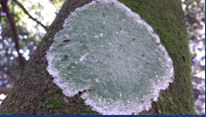
Hyphae, Mycelium, Ascocarp/basidiocarp
What are the anatomical parts of fungi?
Numerous small filaments
What is the hyphae?
Hyphae grouped together into a mass
What is the mycellium?
Fruiting body
What is the ascocarp/basidiocarp?
Chytridomycota, Zygomycota, Glomeromycota, Ascomycota, Basidiomycota
The five phylogenic classifications of fungi:
Ancient fungi, Unicellular, Aquatic decomposers, Parasites
Characteristics of Chytridiomycota?
Bread molds
What are Zygomycota?
Mutualists that form a symbiotic relationships with the roots of plants. Ex: Mycorrhizae
What are Glomeromycota?
Truffles, Morels, Yeast, Pencillium
Examples of Ascomycota?
Mushrooms, Shelf fungi, Puffballs
Examples of Basidiomycota?
Protists, intracellular parasites, dangerous to humans.
What are microsporidia?
Militaris and sinensis
What are the two types of cordyceps we examined in the lab?
Which of the following is NOT a property of fungi?
Prokaryotic
______________ are specialized hyphae that can penetrate host cells and absorb nutrients.
Haustoria
What is the largest phylum of fungi?
Ascomycota
Slit-like structures found beneath the cap of a typical mushroom are known as ______________.
Gills
Lichens with leaflike thalli that overlap, forming a scaly, lobed body, are known as ______________.
Foliose
Most fungi have cell walls composed of ______________.
Chitin
What connects the mushrooms in a fairy ring below the ground?
A thick network of mycelium.
Meiosis in the life cycle of a zygomycete occurs in the ______________.
Sporangia
Which is not a basidiomycete?
Black bread mold
False
T/F Basidiospores are asexual spores produced on peg-like sterigma on a club-shaped basidium.
Cutting through a cap of a mushroom exposes gill tissue. What is seen when scrapings from gill tissue are placed on a slide under the microscope?
Club-shaped basidia and basidiospores
Lichens are a symbiotic relationship between ascomycetes and ______________.
Green algae or cyanobacteria
What role do lichens play in the environment?
All of the above
______________ are the multicellular fruiting structures of ascomycetes, which produce sexual spores.
Ascocarps
Lichens are sensitive to ______________.
Air pollution
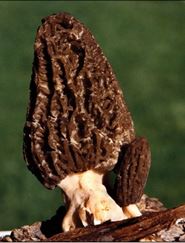
Name the phylum to which this species belongs.
Ascomycota
What occurs when a sporangiospore of a zygomycete lands on a slice of bread?
All of the above
The role of the fungus in a mycorrhizal relationship is that of ______________.
Helping the plant take in phosphate and other nutrients
Which of the following is a characteristic of jellyfish?
A and C
Which class is also called “flower animals”?
Anthozoa
The word Porifera comes from a Latin word that means ______________.
Pore-bearer
A medusa is often described as ______________.
an umbrella-shaped body with tentacles that hang down
While swimming in the ocean, you feel a sting on your leg from a Portuguese man-of-war. The sting was caused by ______________.
nematocysts
While exploring, you discover a hydrozoan called Hydra sp. Where did you find the Hydra sp.?
Pond
Earthworms are monoecious, meaning _______________.
they possess both male and female organs
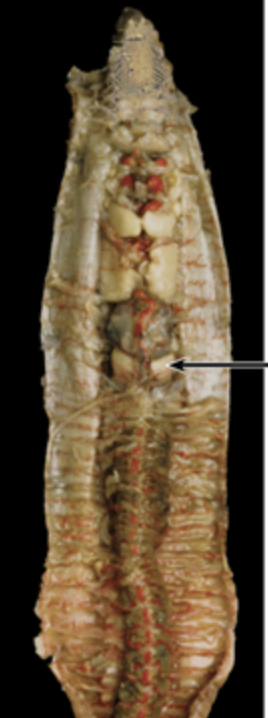
Name this thick walled muscular structure found in the earthworm.
Gizzard
Diploblastic animals have which germ layers?
Ectoderm and endoderm.
The central cavity of a sponge , the ______________, is lined with ______________.
spongocoel, choanocytes
What are the two clades of protostomes?
Ecdysozoa and Lophotrochozoa.
Which class of the Platyhelminthes consists of the parasitic flukes?
Trematoda
Which of the following is TRUE of flatworms?
All of the above
Insects vary from other arthropods by having _______________.
two pairs of wings and three pairs of legs
Which of the following have bodies divided into a head, thorax, and abdomen?
A and C
Millipedes are ________________.
B and C
Ecdysis is the process of _____________.
molting
A radula is present in which mollusc?
A and C
What class of molluscs provides us with our seafood dinners of clams, oysters, mussels, and scallops?
Class Bivalvia.
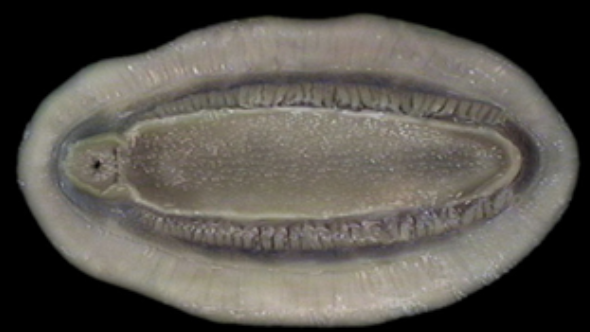
This is the ventral surface of what organism?
Chiton
The visceral mass region of a mollusc contains which of the following?
Digestive, respiratory, circulatory, and reproductive systems.
Members of phylum Nematoda live in which of the following environments?
All of the above
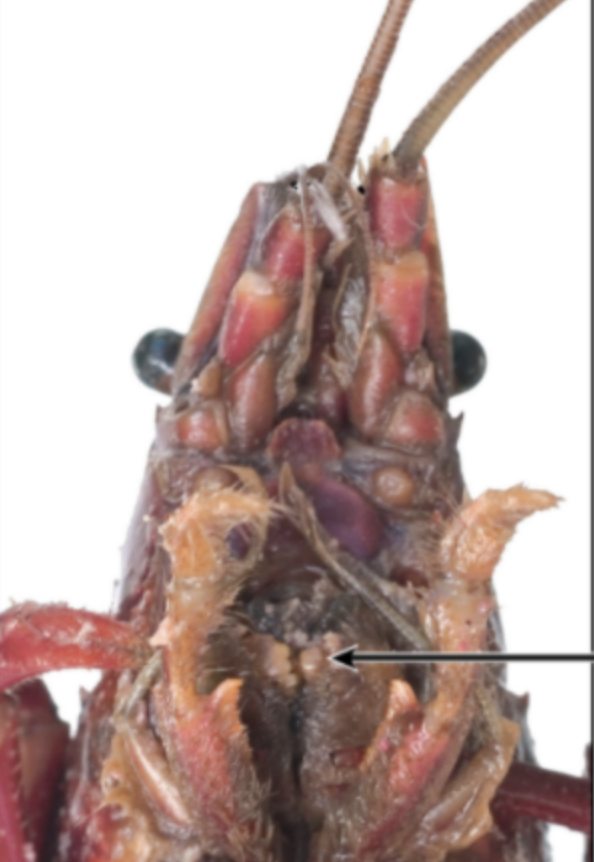
Name this structure in the crayfish.
Mandible
What is the function of pleopods in crustaceans?
Swimming
Which pairing of arthropods does not belong in the same subphylum?
Centipede and scorpion.
Which of the following is a characteristic of a nematode?
A and B.
Echinoderms have ____________ symmetry.
Radial
Which class of the superclass Gnathostomata is characterized by cartilaginous skeletons?
Chondrichthyes.
What is the largest and most diverse chordate group?
Osteichthyes
Where does water enter the vascular system of a starfish/sea star?
Madreporite.
Which of the following is NOT true of a starfish/sea star?
A notochord runs along the dorsal midline.
A lateral line system in many fishes serves to detect ______________.
Vibrations.
The brains of vertebrates form at the _______________ end of the nerve cord.
Anterior
Cnidaria
What phylum does this specimen belong in?
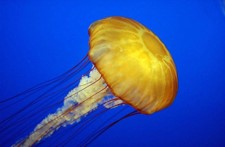
Ancient fungi, aquatic decomposers
What makes up Chytridiomycota?
Bread molds
What makes up Zygomycota?
Platyhelminthes
Which phylum has flatworms?
Mycorrihizae, mutualists
What make up Glomeromycota?
Truffles, morels, yeast, penicillium
What makes up Ascomycota?
Mushrooms, shelf fungi and puffballs
What makes up Basidiomycota?
Yes. Porifera, no symmetry
Is this an animal? Name the phylum and symmetry
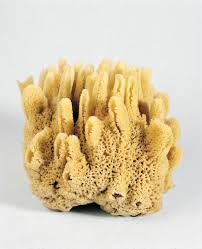
4
How many feet do tetrapods have?
Yes
Are snakes tetrapods?
Ray-Finned (“bony”) Fishes
Actinopterygii
Lobe-finned Fishes. What tetrapods evolved from.
Sarcopterygii
Dipnoi
What order of the classes of fish make up the lung fishes?
Two lives
What does amphibian mean?
Organisms that gain heat from external surroundings.
What are ectotherms?
The amniotic egg
What do reptiles and aves possess that is unique to them?
Amphibians are dependent on water to ______________.
Lay eggs
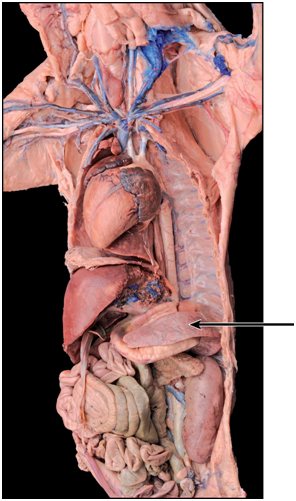
Name the anatomical feature shown on the image of the deep viscera and associated structures.
Spleen
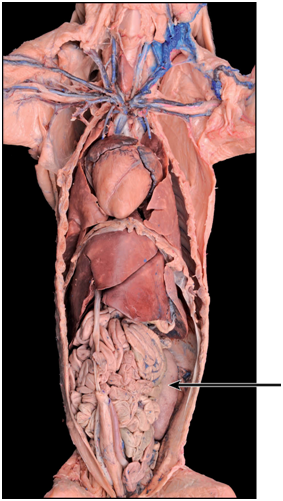
Name the anatomical feature shown on the image of the ventral view of the viscera.
Kidney
Mammals can be distinguished from other tetrapods by the presence of?
All of the above
Mammals and reptiles share this derived feature that distinguishes them from amphibians:
Amniotic eggs
Which of the following groups shares the most features with (and is most closely related to) birds?
Reptiles
Protostomes, Deuterostomes
In ______, the blastopore gives rise to the mouth and in _______, the blastopore gives rise to the anus.
Which of the following are characteristics not found in the phylum Echinodermata?
A body wall containing an endoskeleton of calcareous ossicles with surface spines.
Which of the following are found in the class Chondrichthyes?
B and C
Members of the subclass Actinopterygii make up 95% of vertebrate species and have the following characteristics: __________________.
All of the above
What evidence links echinoderms, hemichordates, and chordates?
All of the above
Poison, crypsis, thorns, spines, trichomes, idioblasts, mutualism
What are the plant defensive compounds?
Foliose, Fruticose, Crustose
What are the three types of lichens?
Radula, used for eating by breaking down food particles
What is this and what is it used for?
